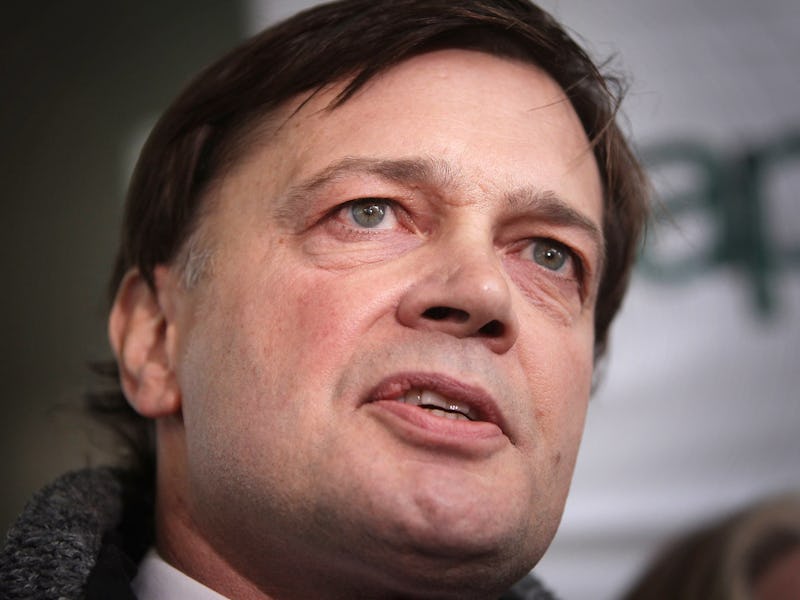I Went to a Morning Showing of Andrew Wakefield's 'Vaxxed' and Made Weird New Friends
Andrew Wakefield's 'Vaxxed: From Cover-Up to Catastrophe' purports to deal with the "facts."

The theater was fuller than it logically should have been at 11:00 a.m on a rainy Thursday in Manhattan. That anyone would want to see disgraced doctor Andrew Wakefield’s agit-prop film Vaxxed: From Cover-Up to Catastrophe for non-professional reasons confounded me already. The twenty people, including a hip young couple and their daughter, further dampened my already dampened spirits. Why were these people here?
My answer came by way of rabid applause at the end of the 90-minute film. Apparently the anti-vax doc dropped by Robert De Niro from the Tribeca Film Festival lineup, which I thought was unremarkable aside from its questionable message, was a total crowd pleaser. The audience wanted their suspicions confirmed and that is precisely what the film haltingly attempts to do. When I spoke to the clappers, they told me that they were just happy to get “facts.” Apparently they were looking for very specific facts that could be connected to create a nefarious narrative arc.
In essence, the film contained three facts:
1) The CDC whistleblower William Thompson, Ph.D., recently claimed that the government agency covered up studies showing a link between vaccination and autism.
2) His case was brought to the House by Republican Florida Representative Bill Posey in October 2015, where he urged Congress to subpoena Thompson and hear his story out. 3) Congress has not yet called Thompson to the stand.
The rest is speculation. A narrative, pieced together from surreptitiously recorded phone calls between Thompson and a Simpson University biologist named Dr. Brian Hooker, drives the film’s exploration of the covered-up documents and attempts to answer the question Wakefield splashes across the screen: Did the CDC commit fraud? Hooker’s voiceovers suggest the scientists involved in a 2004 study pulled a number of shady science moves behind the scenes: They changed their outline for the study when the initial results showed a vaccine-autism link; they omitted data from the study and destroyed the evidence; they interfered with justice by publishing a fraudulent article in the journal Pediatrics that disqualified the claims of parents appealing for payment at “Vaccine Court.”
Few numbers are pulled out of Thompson’s secret documents, illustrated multiple times with a hand literally pulling folders out of a locked safe. There’s one graph that resurfaces multiple times: a line, stretching ahead into the future to the year 2032, marking the point where, if autism diagnoses continue to rise at the rate Thompson says they are, 50 percent of kids — and 80 percent of all boys — will fall on the spectrum. Those projected rates are based on the data, hidden back when Thompson was at the CDC, that reportedly show a 164% increased rate of autism diagnosis in kids who receive their vaccinations “on time.”
These numbers are crouching in a shrubby montage of testimonials from parents like John and Polly Tommey, who started the magazine Autism File after their son Billy showed autistic tendencies post-vaccination. The videos, admittedly, are heartbreaking. A good half of the footage in the film is made up of home videos of autistic infants failing to make eye contact, rocking back and forth, banging their heads on walls. We meet a teenage Billy. He’s overweight and angry, screaming “I’m going to kill Daddy.”
I’d want answers too, but I’d like to think I wouldn’t turn to the fringes to find them.
Wakefield is careful to qualify all of his interviewees: Polly, a nutritionist, had initially dismissed her “homeopath” mother for being unscientific before she heard the truth. Dr. Doreen Granpeesheh, a founder of the Center for Autism and Related Disorders, features prominently in the film, speaking knowledgeably about the rise of autism diagnosis rates in the early 1990s. MIT’s Stephanie Seneff, Ph.D., lists off her scientific qualifications before repeating that by 2032, 80 percent of boys will be on the spectrum.
For a piece of advocacy directed by the father of the anti-vaccine movement, Vaxxed looks an awful lot like a documentary. Wakefield drops in, between the testimonials, as the voice of scientific reason. He sounds like a doctor. He’s calm and cool, a marked contrast to the hysterical parents and indignant doctors he’s managed to corral. Wakefield doesn’t have to do any arguing in the film. His subjects do it for him.
Speaking with other audience members after their rounds of raucous applause, it became clear that Wakefield might have a successful (and probably necessary) second career in filmmaking. I hadn’t been convinced of anything, but his fans loved the thing. The father of the young girl seated in front of me was particularly thrilled with the movie. “This will never be reported,” he told me. He’s not wrong; reporters wouldn’t ignore scientific consensus. When I pressed him about whether he’d vaccinate his child, he said, “How can I after seeing the facts laid out like this?”
Another member of the audience, clearing the Angelika Film Center after rounds of raucous applause, told me, “They need to subpoena that Thompson guy.” And maybe that’s true, if only to whittle Wakefield’s three facts down to two. But the man went on, telling me that his wife was a homeopath and so he’d already had his mind made up coming into the screening.
He was a fan and he’d enjoyed a movie made for him. As for me, I forgot the movie quickly. But I won’t forget the audience and I won’t forget the moral of my journey in the brunch-hour dark: Wanting facts and wanting the truth are not the same thing.